Photo
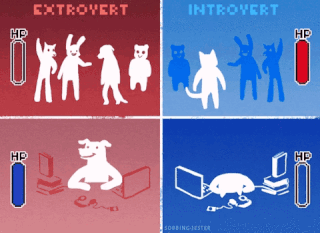
Introvert vs Extrovert
16K notes
·
View notes
Note
Hi I was just wondering the main differences between istj and entj. From what I have seen of them, they seem very similar so I was wondering what the differences are.
Trying to get back into this, starting with an old question.
ISTJ: Si Te Fi NeENTJ: Te Ni Se Fi
The reason why they would seem similar is that outward expression of their thoughts through their Te function. They both seem to be critical thinkers and objective decision-makers, and they may seem alike in their behavior to others, the psychology behind their behavior is in theory and in practice, very different.
The main different comes in Si vs. Ni. ISTJs are critical thinkers and objective decision-makers, yes, but their interpretations and decisions are largely based on experience. They’re not theoretical people. They’re entirely practical, and they believe in what they have seen pan. They’re logical and detailed in their thinking, but to them, the credibility of something doesn’t come from the theory behind something, rather the application. ENTJs on the other hand are highly theoretical. They’re also critical in their thinking and objective when making decisions, but they’re largely conceptual and they believe in what makes sense to them, regardless of its acceptance or practical usage. They believe that the height of knowledge lies in experimenting with what is unknown, rather than implementing what is known. This is an experience vs. ideas, theory vs. proof.
This causes difference in values and motivations as well. ISTJs are big believers in duty, obligation, and honor. Because credibility in their mind is based on experience, they believe that their own character is based on their actions. Unless one of their functions is unhealthy, they will always aim for what is right, and they will do so through their actions, not their words. Recognition means less to them than their own moral compass and their own duty. ENTJs on the other hands try to forces of change. They are big believers in action as well but more so as a tool to achieve their goals because they tend to be very ambitious and highly goal-oriented. They believe in their own capabilities more so than any formula for success. For example, if an ISTJ does something and it is successful, they might attempt to understand the factors that led to its success and replicate them. If an ENTJ does something and it is successful, it will heighten their belief in their capabilities which they will direct elsewhere to a bigger project.
To summarize, ISTJs believe in action as a principle, whereas ENTJs believe in action as a tool.
An example of an ISTJ from the fictional world is Stannis Baratheon from Game of Thrones. He believed the Iron Throne to be his by right, and he had the immense sense of duty to fulfill that right. He did not command his army from behind the scene; along with being a strategic commander, he was a fearless warrior. He was stubborn but sensible, and he had an unbreakable code of honor. He was ruthless in his attempt to acquire the throne as his duty, not his ambition or desire. He was an advocate for justice, not afraid to kill those he stood against, while at the same time rewarding those who stood with him.
An example of an ENTJ is Frank Underwood from House of Cards. Although he is fairly unhealthy in his functions, he depicts many of the qualities. He is largely goal-oriented and "extremely effective at what he sets his mind to.” His main goal is to further is own career, which he does so through any means necessary. He is a master strategist who looks at the bigger picture. He is extremely intuitive in nature and uses this intuition to manipulate those around him in order to further his own schemes, again turning his capabilities into a tool for success. I could write a different post for why I believe him to be an ENTJ over ENFJ/ENTP, as there’s much to be said on the topic.
#mbti#myers briggs#myers briggs type indicator#mbti analysis#entj#istj#entj vs istj#istj vs entj#si#ni#te#frank underwood#stannis baratheon#Anonymous#Silence will fall when the question is answered
14 notes
·
View notes
Note
How would you describe each cognitive function in one word? Provided they are used maturely and appropriately
Te: Accuracy
Ti: Precision

Ne: Divergent
Ni: Convergent
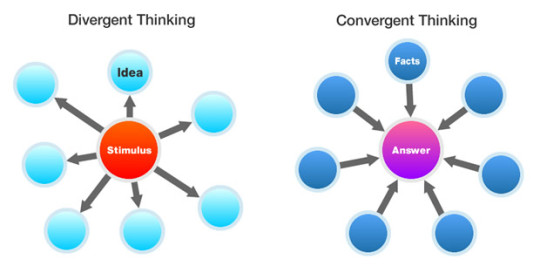
Se: Observation
Si: Retrospection

Fe: Empathy
Fi: Sympathy
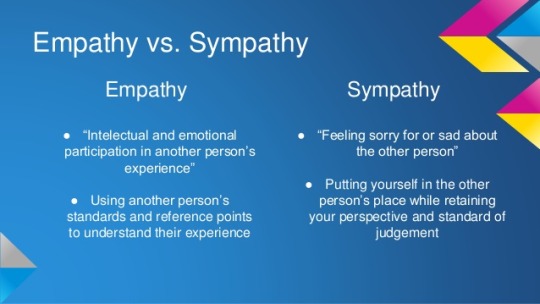
3K notes
·
View notes
Text
What the types are looking for in a relationship
ENTJ: The Bonnie to their Clyde
ESTJ: The Hera to their Zeus
INTJ: The Watson to their Holmes
ESTP: The ball to their bat
ISTJ: The end to their beginning
ENFP: The doughnut to their sprinkles
ESFP: The icing to their cupcake
ISTP: The motor to their car
INTP: The Twain to their Tesla
INFP: The paper to their pen
ISFJ: The sheet to their cookies
ESFJ: The life to their party
INFJ: The light to their darkness
ISFP: The alpha to their omega
ENFJ: The friend to their foe
ENTP: …The password to your Netflix, dammit.
1K notes
·
View notes
Text
How To Type Someone
After a lot of questions regarding this: here’s my full, long answer. Disclaimer that this is not 100% within the realms of the MBTI theory or the Jungian function theory. I didn’t get any of the interpretations from a direct external resource. This is the sense that I have made of everything that I have read and researched over the last few years, and this is how I have learned to type people.
Now, I’m going to split this post into three parts
How to type someone through overall type descriptions
How to type someone through identifying cognitive functions
How to actually identify each cognitive function.
MBTI Types Identification - General
I’m going to put a lot of techniques into this category, but this is basically all the ways to type someone without the use of cognitive functions.
(1) - dichotomies
So the first way to type someone or yourself is to go one by one and identify where they stand on each dichotomy distinction. Introvert or extravert? Intuitive or sensor? Feeler or thinker? Perceptive or Judger? A rundown of what all of these words can be defined as:
Introvert - less social, more introspective
Extravert - more social, likes to interact with outside world
Intuitive - conceptual and innate understanding of abstract ideas
Sensor - concerned with the concrete real world
Feeler - more subjective, emotional, easily moved
Thinker - more objective, thoughtful, thinks things through
Perceptive - unorganized, spontaneous, laid-back
Judger - organized, prefers planning and structure
All very basic, simple, clean-cut. A lot of people consider these four dimensions to be scales rather than being either/or, so you type someone based on which of the two they’re closer to in each dichotomy.
(2) - descriptions
Because every combination of letters can lead to very different outcomes, it is sometimes more accurate to use the dichotomies to distinguish yourself in the letters that you are sure about, and then finalize your type by reading all of the descriptions of the potential types you could be (distinctions that you are unsure about -- often N and S). So read the descriptions about how each type’s personality is overall and see which description resonates with you more. Try different sources, not just one website.
(3) - stereotypes
Instead of reading the overall descriptions of the types (ie INFPs are idealists), try looking deeper into some habits that are associated with each type (ie INFPs are likely to enjoy all kinds of art, especially in the fantasy genre). Since stereotypes are more specific than broad terminology, they can be a better indicator of your or someone else’s type. Habits and behavior is much easier to notice, and since people's habits and actions more often than not are a result of their personality, they are likely to correlate. Of course, a person being an INFP may not be the cause of them daydreaming a lot, but it is a likely correlation. Not all stereotypes about a type have to apply to you for it to be your type, but since these are specific things, if a lot of the stereotypical habits of a type match up with you, it is likely your type.
(4) - personality tests
One of the easiest ways of determining a person’s personality type can be simply by asking them to take a personality test. Now, there are a lot of tests out there you can take, and they are all different. The ones that I’ve seen pop up the most are the 6 personalities test, the Similar Minds test, the Similar Minds cognitive functions test, and the Human Metrics test. You can also go with the 123 test, the Psych Central test, or the Celebrity Types test. There are a lot out there. If you are ever unsure of your type, try multiple tests. They all have their pros and cons that I will not go into right now, but here is a good accuracy review that you can use as reference, rating the Keys 2 Cognition test the highest.
There are many more tests out there are well, but the one I personally like the most is the Similar Minds cognitive functions test simply because it opens up the door to the cognitive function theory.
Speaking of which... let’s see how to type people according to their cognitive function stack.
MBTI Types Identification - Functions
The sheer basics can be found on my Functions page. Give it a read if you do not know the basics about the Jungian cognitive functions and how they stack up in order to form a type, and let’s get straight into it.
(1) - dominant/auxiliary functions
This is how I type most people and how I type songs while making the MBTI playlist. For this, you just have to pinpoint the most prominent cognitive function in a person, what they do without thinking, their most natural or obvious inclination. To give a few examples, for a person who likes being in charge, it might be Te. For a person who has a wild imagination, it might be Ne. Just look for the biggest and most prominent part of their personality that correlates with one of the signs.
Once you have chosen the first function, know that you know have two types that this person could be. If the first function was Te, the second will either be Si or Ni. When your options are limited, it can be easier or harder to type. Every case is different. Pick whatever seems more appropriate.
Now, the third part is identifying which function is dominant and which is auxiliary, and for this you actually have to identify their third (tertiary) function. Why? Because the third function balances out the second, so whichever function seems to have a balance is going to be your auxiliary function. The one that is imbalanced and dominating in its own right is going to be your dominant function. If you identified the first function as Te and the second as Si, and you feel that the Te is more balanced because although they like being in charge, saying what’s on their mind, and being definite, they are also the kind of people who say what they personally feel is appropriate (Te auxiliary, Fi tertiary) rather than not judging appropriateness at all before they say things (Te dominant, Fi inferior). At this point, you have their stack sorted out, and this person is ISTJ according to their stack.
(2) - introversion/extraversion tendency
Follow the first two steps of the last approach, but after that, instead of identifying the tertiary function to figure out the order, judge whether they are more introverted or extraverted – not just in the social sense, but do they interact with their environment more or are they more introspective and in their mind? If you know whether they exist more in the internal dimension or the external dimension, and you know their strongest inclination for each dimension, you can safely judge whether their dominant function is introverted or extraverted. Be careful doing this though because more often than not, the extraverted tendencies show themselves more than introverted tendencies, so be careful. You can also judge based on the social aspect because more often than not, it does correlate with their true internal/external tendency.
(3) - toxic people
If a person is toxic and/or overbearing, their dominant function will be extremely prominent and used in a negative way. For that, educate yourself on how each function is when it is toxic, and if you see those tendencies in a person, it will almost always be their dominant function. Once you have the dominant function, again you’ll have two choices as the auxiliary function, and after that, you will have your full stack. For example, if the person in the ongoing example hated stepping out of their comfort zone and were very stuck up about doing things the way they’ve always done it, never taking a risk, this is a toxic version of the Si function. If much of this toxic behavior comes out verbally and brashly, you can also pinpoint the Te. The person is as a result an ISTJ.
(4) - in the loop
This is also another example of an unhealthy personality, and it is when you’re noticing two functions in them that are very prominent that are both introverted or both extraverted, and either side doesn’t balance the other one out. This is because the auxiliary function is being repressed. If a person has more-than-normal introverted inclinations and next-to-no extraverted inclinations (like quite a lot of people on this website), chances are that their personality is very unhealthy, and they are stuck in an introverted loop. Their function stack is: Xi Xe Xi Xe. You can now pinpoint their functions by looking only at the first and third function. If this is a person that gets offended very easily, doesn’t like being told that they are wrong, and takes everything very personally, their first function is probably Fi.
Now, their tertiary function could either be Si or Ni. So you have to look at… well how do they create the opinions that they believe are so superior to everyone else’s? Is it how they have always felt or due to experience that others are too ignorant to understand, or is it based on a very theoretical sense of right and wrong that they believe others are too stupid to be able to comprehend? The first would make them Si, the latter Ni. In the first case, they would be INFP, the latter ISFP.
^^ Now all of these are ways that you can identify someone if you are able to identify cognitive functions. How do you identify cognitive functions though?
This is a little bit more tricky
Cognitive Functions Identification
(1) - literal
This is basically putting 2 and 2 together and making 4. There are two components of a cognitive function. For example, for Ne, it is Intuition and extraversion. Let’s call Intuition the nature of the function and extraversion the dimension that it exists in (external dimension). See if you can pinpoint both things, and there’s your function. Instead of me giving you a singular example, let me tell you how to pinpoint each function like this.
Te - Thinking - Clear, objective, thought-based, not significantly affected by one’s emotions, like dealing with facts and logic. Extraversion - Outward expression of information, their preference for clarity often leads to organization of external environment. Together, this is Te.
Ti - Thinking - Again, clear, objective, thought-based, not significantly affected by one’s emotions, like dealing with facts and logic. Introversion - personal, do not deal with the outward expression of objectivity but internal knowledge and introspection, and their preference of clarity leads them to want to know everything about a subject. The 2 + 2 here is Ti.
Fe - Feeling - Subjective, emotional, dealing with what is appropriate, sense of right and wrong. Extraversion - deal with appropriateness, what is socially acceptable, affected by other people’s mood, feelings, and the atmosphere, prone to expressing feelings. Together, the two tendencies make Fe.
Fi - Feeling - Again, subjective, emotional, dealing with morality, sense of right and wrong. Introversion - personal, concerned with own perspective only, and again: subjective (not subject to a lot of external input or influence). Together, this is a feeling function that exists in an internal dimension, ergo Fi.
Ne - Intuition - Very concept-based, likes the figurative more than the literal, prone to making connections, instinctive not consciously done. Extraversion - make outward connections, vocal about their connections, have a random but identifiable train of thought to other people (external environment). Intuition in the external dimension is Ne.
Ni - Intuition - Again, very concept-based, likes the figurative more than the literal, prone to making connections, instinctive not consciously done. Introversion - make inward connections, relate ideas to concepts already known or through internally processed connections, and as a result, their train of thought is often not identifiable by other people (external environment). Intuition in the internal dimension is Ni.
Se - Sensing - Deal with the concrete and not the conceptual, very engaged in the real physical world, like the literal more than the figurative. Extraversion - like to use their senses to be fully in tune with the outside world and are fully present in any given moment, focus on the here and now, likely to be kinesthetic learners. The two make Se.
Si - Sensing - Again, deal with the concrete and not the conceptual, very engaged in the real physical world, like the literal more than the figurative. Introversion - heavily internalize what goes own in the outside world, use it as experience, also likely to be kinesthetic learners, attention to detail, rely on memory. Altogether, this is the equation for Si.
You see what I mean? Extremely literal. The core of the functions will always be feeling, thinking, intuition, or sensing, but adding the extraversion and introversion dimension to it literally is a good indicator of what that function does. Using this as a go-to can be very accurate.
(2) - descriptions
Now, when you read descriptions of overall types, the terminology can either include or exclude the cognitive functions. If this description is along the lines of “Because ISTJs have Si and Te as their strongest functions, they like an established structure” and it gives you an explanation of how this combination can lead to certain preferences in the type, this is what I mean by descriptions. You are starting with the overall type and then looking inward into the more specific components of the type. These descriptions will explain cognitive functions within the context of which type you are talking about. If you have a type in mind for someone, whether it is using the dichotomies or any other indicator that you are unsure about, this can be a good way to confirm or deny your suspicion.
(3) - stereotypes
Following how I distinguished descriptions and stereotypes before, stereotypes are much more specific, and they relate more to habits and don’t have to apply to everyone. This doesn’t discuss the functions within the context of any type but overall. Let me share some such explanations with you:
Te - organized, prefer structure, very decisive, make very objective decisions, prefer clarity, very direct and to-the-point, don’t tend to have a filter when they speak, like to voice what they think and correct people, in arguments more likely to talk than listen, look less towards logic and more towards basic concrete facts, very practical
Ti - much more scattered, not as objective in their thinking because they think of things for the sake of thinking about them, will think about space and aliens and the future, aren’t usually vocal about their thoughts, less direct, don’t draw a very rigid line between right and wrong, less likely to correct people, prefer logic more than facts, tend to like logic games, puzzles, and games like chess (things that have no practical value but stimulate their mind).
Fe - very social, know what’s socially appropriate and adhere to it, like keeping the mood, atmosphere, and morale up, easily affected by the aforementioned things, can feel when a person is feeling a certain way, easily connect with other people through their emotions, can be very convincing, tend to like pleasing people, don’t like arguments and fights
Fi - very personal, have strong opinions and can be a bit stubborn, don’t like being told that they are wrong, have a strong identity of self and it reflects in everything, prone to say “I feel” “I think” “In my opinion.” Need time to figure out how they feel about something, very subjective, treasure people’s unique perspective of things.
Ne - outward connection of ideas, like brainstorming, prone to go off on tangents when they are talking, love research, can find connections between seemingly unrelated things, wild imagination, used to create fantasy stories/art, love to theorize, use figurative language a lot, like to ask “what if,” stimulated by a lot of information, connect details to each other and to the bigger picture, like new opportunities and experiences
Ni - inward connection of ideas, relate theoretical ideas to themselves and process them inwardly, their thoughts are likely to go off on a tangent, and you’ll never know how they got from point A to point B, also like theories, have a strong sense of others, good at instinctive reasoning, pick up on small details, go from the big picture to the details
Se - in tune with the physical environment, generally like to do activities that heighten their adrenaline and stimulate their senses, quick to remember things they picked up on through senses (smells, colors, etc), very present-oriented more so than the past or future, don’t overthink things, it is what it is, more into concrete truth than concepts
Si - internalize the physical environment, tend to be past-oriented because they remember information from their environment and apply it in the future, treasure experience, tend to go with what they know, don’t like too much experimenting, reliable, tend to be very sentimental, remember specific dates and faces
You can find much more detail in this detailed post by me, but for now, this is enough. These are specific habits or tendencies that heavily correlate with each type, and if you an pinpoint a lot of these habits in a person, that function is likely to be one of their stronger functions.
(4) - toxic functions
Another way to type a person who has a toxic and imbalanced personality is to pinpoint a specific function that is in its toxic state. This function will usually end up being the dominant function. Let me reference you over to another old post of mine that lists a few tendencies of an unhealthy function. A function itself goes unhealthy when its counterpart is heavily underdeveloped, so a dominant function will be toxic because the inferior is undeveloped. This is why an unhealthy Te might be inconsiderate and brash (underdeveloped Fi), and an unhealthy Fi might be stubborn and easily offended (underdeveloped Te). You can use this to pinpoint singular functions.
Conclusion
This is basically all of the ways that I know to type a person: you can steer clear of cognitive functions and stick to dichotomies and descriptions representative of dichotomies. You can also use cognitive functions; you can look into the dynamics of the cognitive functions within a suspected type or use detected cognitive functions to deduce a person’s type.
There might of course be other ways to type a person, but if you’re asking me, this is the only help that I can provide you aside from answering your more specific questions, so make of this what you will ^^
#this is long#super long#so i haven't read it through a second time before posting it#if there are any mistakes#be it typos or wrong info or whatever#please tell me#i honestly don't have the willpower to reread it#kthnx#long post#oops#mbti#mbti theory#mbti functions#mbti types#myers briggs#myers briggs type indicator#carl jung#jungian theory#jungian function theory#ne#ni#se#si#te#ti#fe#fi
175 notes
·
View notes
Photo

Thank you guys for everything! For the questions, discussions, theories, support, and basically just your time of day!
It means a lot<3
13 notes
·
View notes
Note
all my buddies took the mbti test and i noticed one thing: every single one of them are fucking infp.(except two, an intp and an enfp. they'll be sacrificed.) i'm an intp. is there like a reason for this or am i like some weird ass infp magnet? thanks.
Ne does seem to attract Ne because it builds upon each other, and people who have a wild imagination like being around others with a wild imagination, but it’s unlikely that all of you are as you typed yourselves. People often mistype themselves in these tests based on what they’d rather believe about themselves. When the questions are like:
What is more compelling to you? a) reality ---------------------------------> (sensing) b) dreams ------------------------------> (intuition)
You’re bound to mistype yourself.
I’m an INFP, but in the earlier dichotomy tests that I took, I’d always type as an INTP because in my mind, since I didn’t share what I was feeling or easily emotionally connected with other people, I thought that I was a thinker, but that is in essence what being an Fi-dom is. It’s being so at one with your feelings and being so automatically subjective that you don’t have to sit there and figure out your feelings. And since you’re more consciously trying to separate your feelings from things (inferior Te), you tend to answer more questions as a thinker would. There are many things about the other functions also that so heavily correlate with the wrong side of the dichotomy that typing yourself as just I vs E, N vs S, etc is quite unreliable.
For example, an INFJ is likely to type themselves as an INFP because INFJs like to share their feelings and make sure everyone is feeling alright which would be considered a F-type. Since they are Ni-doms, they are also very perceptive, and in the dichotomy tests, the way that P vs J is laid out, some might lean more towards a P-type even though nothing about their personality matches up with an INFP (Fi Ne-Si Te).
So the margin of error in these tests are due to a mixture of (1) people not being honest in tests and (2) the fact that the dichotomy tests are not built to tell you anything deep or meaningful about your personality. These two things make it very easy for someone to mistype themselves, and among the lot of you, a few of you probably did mistype yourselves.
If you guys want to correctly type yourselves, look into the cognitive functions and see what resonates with you.
#mbti#mbti theory#mbti functions#myers briggs#myers briggs type indicator#infp#intp#mistyping#Anonymous#Silence will fall when the question is answered
15 notes
·
View notes
Note
One of my INTJ friends is dating an ENTP. The INTJ feels like the ENTP and her don’t have a solid, deep emotional connection and it’s starting to affect their relationship. I don’t know how to help her because I’ve actually had the same issue with ENTPs… ADVICE NEEDED!!! How can you get an ENTP to emotionally connect with you??
I can’t give you a foolproof way to connect with ENTPs, but the thing that I’ve noticed with the ENTPs that I know is... you may feel like you don’t have a deep enough connection with them because they don’t share their feelings or might not tell you stories about their past, but that’s really not how they define an emotional connection.
When they’re struggling, they are more inclined to hide it and laugh it off, but to have an emotional connection with them, you have to know when to call bullshit (as in you have to know their personal giveaway signs that they’re not okay which an Ni-dom should have no problem doing). And when you do, you have to not pester them about it or try to make them tell you what’s wrong. You have to just show them that you care. Say that you thought they were feeling a bit down, so you made them hot chocolate, and then don’t even mention it; just sit there and chill with them. To ENTPs, for the most part, that is an emotional connection.
And if they ever need to talk to you, as long as you’re showing them you care, they will talk to you. But just because they’re not talking to you so far doesn’t mean that the connection is not there or that they don’t need you. What they needed was your company because they felt safe and cared for when they were struggling, and you gave them what they needed from you even if they didn’t need you to talk them through being okay. The ENTPs that I know, I try to not make them open up, but overtime, they open up when they need to.
The thing with this is, even if you think they’re not feeling okay, but there’s nothing particularly wrong with them, and they tell you that, they will still be touched that you care, so just always show them that you care, with words and without words. But as time goes on, your friend will start to learn the ENTP’s signs which really mean they’re not okay, using their Ni. Not asking them point-blank what is wrong might be a bit hard for the INTJ, given their Te, but if they try, hopefully everything will work out because the two of them will learn to compromise.
Now if there’s some other more specific reason why your friend is doubting an emotional connection with their significant other, let me know, and I’ll try to help.
#late response#but i will answer all my asks#or i'll try to anyway#mbti#mbti theory#myers briggs#entp#intj#intj x entp#entp x intj#Anonymous#Silence will fall when the question is answered
64 notes
·
View notes
Text
For the few people asking, yes i am still doing this, but it might take some time. I have quite a lot of songs (including submissions by you guys) for infp intp infj etc, but only 2-3 (with no submissions either) for istj estj etc, and i need it all to be even. Keep submitting songs if you want. Until it’s even, I’ll work on other projects and posts as well.
MBTI playlists: submit a song
I am working on playlists for each MBTI type. What I’d like to ask of you is to submit songs for any type that you want to, whether it’s your own and it’s a song you resonate with, or if a song reminds you of any other type. You can even just submit your favorite songs even if you can’t pinpoint a type; I’ll figure it out.
I’m asking because I’m very limited in what I listen to personally, and I don’t want these playlists to be lacking. I want you guys to enjoy them as much as I enjoy making them.
So please submit songs here.

27 notes
·
View notes
Photo

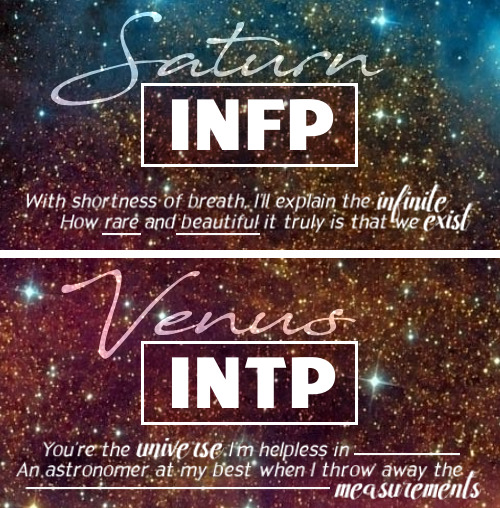

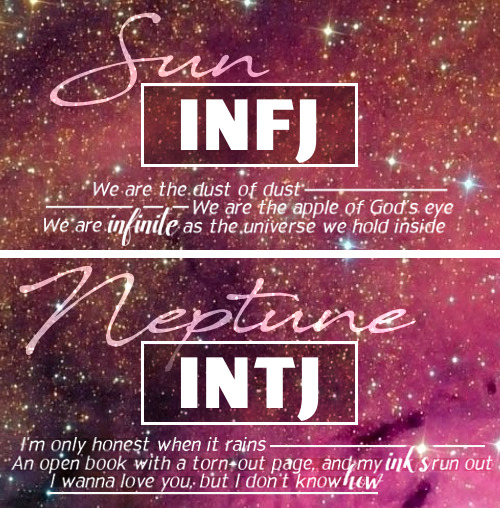
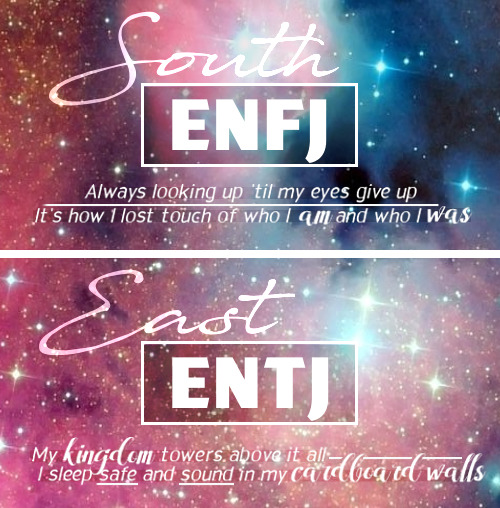
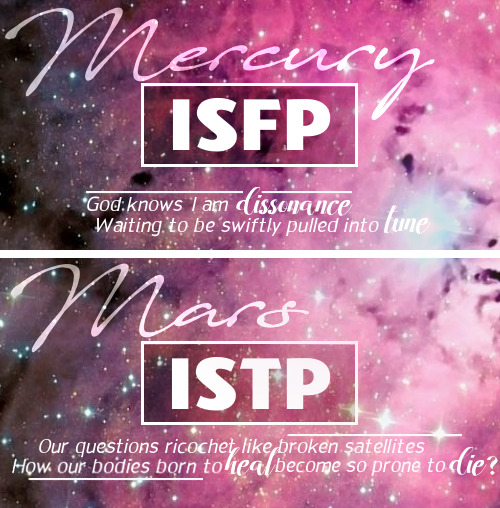
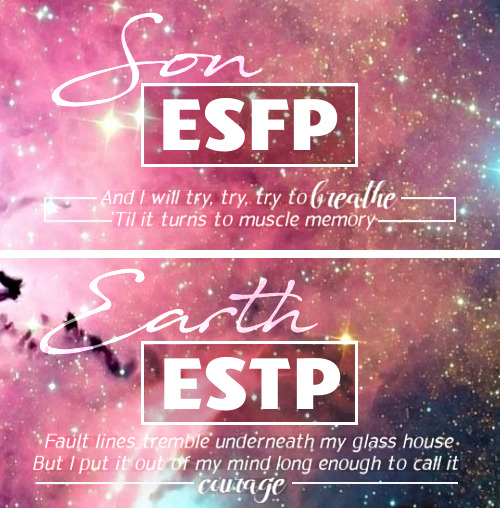
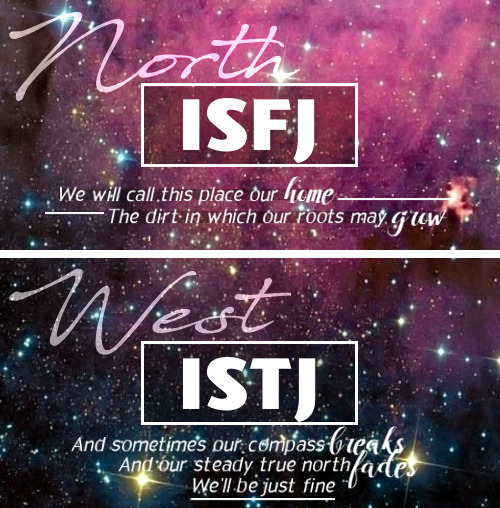
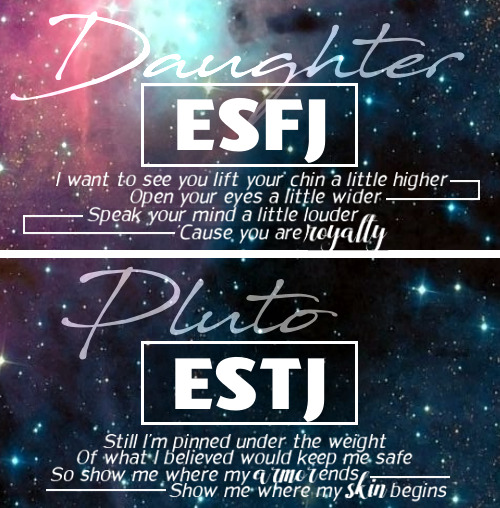

The MBTI types as Sleeping At Last songs.
Open full-size picture to read the chosen lyrics. You can hear the songs on Youtube here:
INFP ENFP INTP ENTP INFJ ENFJ INTJ ENTJ
ISFP ESFP ISTP ESTP ISFJ ESFJ ISTJ ESTJ
The background artwork is by Furea-Flight on DeviantArt.
#i spent so so long on this#i hope you guys like it#and listen to all the songs tbh#not just your type's#because they're all so nice#if you don't like this kinda slow music#just read the lyrics#they're really very nice#sleeping at last#music#atlas#mbti music#mbti songs#mbti#mbti theory#myers briggs#myers briggs type indicator#mbti types#infp#enfp#intp#entp#infj#enfj#intj#entj#isfp#esfp#istp#estp
151 notes
·
View notes
Text
MBTI playlists: submit a song
I am working on playlists for each MBTI type. What I’d like to ask of you is to submit songs for any type that you want to, whether it’s your own and it’s a song you resonate with, or if a song reminds you of any other type. You can even just submit your favorite songs even if you can’t pinpoint a type; I’ll figure it out.
I’m asking because I’m very limited in what I listen to personally, and I don’t want these playlists to be lacking. I want you guys to enjoy them as much as I enjoy making them.
So please submit songs here.

27 notes
·
View notes
Note
can you explain perceiving vs judging in MBTI?
Sure!
So let’s start at square one: in the typical MBTI test which basically classifies you based on the four dichotomies (I vs E, N vs S, F vs T, and P vs J), but there is a deeper layer to it that is the function theory. The dichotomies are more so neatly packed with a bow on top, while cognitive functions are much more dense and open to speculation. It’s up to you which one you prefer, so I’ll give you both answers.
Dichotomy theory
Perceiving means being adaptable and open to change. P-types are laid-back and spontaneous, often. They don’t plan things; not prone to organization. They kinda just observe, feel the vibes, and go with the flow.
Judging means being more set in your ways and liking a defined structure. They like making decisions, getting things done, and having clarity in their lives through planning and organization.
Now if that’s the kind of answer you were looking for, that’s fine, but this is still within square one because the way I see it, what MBTI basically does is give a name to the specific combination of cognitive functions that you possess, so the basic root of the differences between P-types and J-types is in the cognitive functions, not in any description that you’ll find online.
Cognitive function theory
To learn a basics of the functions and how they stack up, go visit my Functions page.
The functions are: Ne Ni Se Si Fe Fi Te and Ti.(extraverted iNtuition, introverted iNtuition, extraverted Sensing, introverted Sensing,extraverted Feeling, introvertedFeeling, extraverted Thinking, and introverted Thinking)
So you’ll notice that perceiving and judging are actually the two terms not in the list, and that is because what the P and J in your type does is determine which functions you do and do not have. It’s not related to any specific functions themselves. Although Ne, Ni, Se, and Si are classified as perceiving functions, and Fe, Fi, Te, and Ti are classified as judging functions, being either a P-type or a J-type doesn’t automatically connect you to all four of the respective functions.
Basically how the theory is laid out, P-types have Ne or Se as their strongest extraverted function and Fi or Ti as their strongest introverted function.
J-types have Fe or Te as their strongest extraverted function and Ni or Si as their strongest introverted function.
So what does this distinction really mean?
P-types are basically much more receptive to information because while dealing with the outside world, they use Ne or Se to take in information. There are so many other distinctions within this (8 distinctions to be specific), but the overall idea is that they’re not decision-oriented and don’t prefer clarity in the same way that J-types do. They like keeping their options open until the last moment, and they like being in the moment and taking opportunities as they come. Now, not all P-types are like this, but this is basically the Ne/Se vs Fe/Te description. I’m an INFP, for example, and I like having a calendar and making to-do lists which all the stereotypes of my type are against. I’m supposed to be more of a double-minded naive airhead, but I’m not. As a P-type, I’m supposed to be spontaneous and adaptable to change, and I only am to a certain extent. That’s because that’s not the kind of distinction that P vs J is. It’s a very very broad distinction that not a lot of specific qualities are associated with.
J-types are the opposite of P-types in the sense that they are much more decision-oriented, and they like clear-cut definitive paths in their life that they are prone to planning and thinking through before diving into them. This isn’t because of an encompassing P vs J dichotomy but because the functions Fe and Te are what we call decision-making functions, and if you have a strong decision making function, whether it’s more objective and absolute (Te) or environment-cautious and situation-based (Fe), you still fall into that decision-oriented category, which makes you a J-type, despite what your further classification is as your MBTI type. I know plenty of J-types that are very adaptable to change as well because they are very in-tune with people, so if they are in a new environment with people that resonate with their Fe like their friends or similar-minded people, then they do enjoy change, so all of the stereotypes and descriptions you read won’t always be accurate.
At the end of the day, the main distinction between P-types and J-types is that P-types have the default setting of being receptive of information and new options that might arise, and they don’t make decisions until they have to. J-types have the default setting of making decisions and being definitive in their actions, and they won’t delay something unless they have to because Ne/Se and Fe/Te distinguish those basic inclinations. P-types do still have Fe/Te lower in their stack, and J-types do have Ne/Se lower in their stack, so it’s not a one-or-the-other kind of deal, but one inclination will come naturally to you, and the other you will have to consciously use and develop overtime. That is what P vs J tells you.
And in my opinion, it’s one of the most important distinctions of MBTI, and it’s not something that you can really be on the fence about. I’ve seen a lot of people say that they are borderline INTP and INTJ (INTx), and that they identify with both, but the thing is: if you’re ever reading descriptions in which both of these types resonate with you, you are not reading the right descriptions. The difference between any type and its P/J counterpart is very fundamental, and you can’t get step one wrong and hope to get the answer right, you know?
P.S. if these descriptions feel too rigid or definitive to you, and you don’t like the stiff lines that it draws between types, you might be a P-type :p
#Anonymous#Silence will fall when the question is answered#idk what i'm doing with my life anymore#time to go back to binge watching tv shows tbh#someone recommend me a good comedy show#like brooklyn nine nine and fresh off the boat and friends#and everything else good in this world#mbti#mbti analysis#myers briggs#myers briggs type indicator#mbti theory#p vs j#j vs p#se#ne#te#fe
19 notes
·
View notes
Text
MBTI playlists: submit a song
I am working on playlists for each MBTI type. What I’d like to ask of you is to submit songs for any type that you want to, whether it’s your own and it’s a song you resonate with, or if a song reminds you of any other type. You can even just submit your favorite songs even if you can’t pinpoint a type; I’ll figure it out.
I’m asking because I’m very limited in what I listen to personally, and I don’t want these playlists to be lacking. I want you guys to enjoy them as much as I enjoy making them.
So please submit songs here.

#because if you guys leave me to my own devices#all the playlists are going to be 90% arctic monkeys and halsey and obscure indie bands#and i'm sure that's not what you guys want#so help a girl out#probably couldn't have posted a more infp gif than this#but let's all ignore that#mbti#mbti theory#myers briggs type indicator#myers briggs#infp#enfp#isfp#esfp#intp#entp#istp#estp#infj#enfj#isfj#esfj#intj#entj#istj#estj#is that all the types#that's all the types#let's get this show on the road
27 notes
·
View notes
Text
MBTI types: the Analysts
Based on the people I know
Part Two.
(Read Part One)

Not really as sheltered and socially anxious as most people think.
Kinda thought of nerds/geeks/”the quiet kid”, and more often than not, they don’t really fight the idea because honestly, who has the time?
They are quite the contradiction in my opinion. INTPs are Ti-dom, so of course they’re thinkers, but they’re not prone to overthinking the things most people overthink like awkward interactions with someone
^ So I guess you could say they have their priorities sorted out pretty well
Never ever gossip. You tell them something in confidence, and they will not only not tell anyone; they’ll probably also forget about it, so that’s reassuring
If you share an interest with them, honestly the best to talk to because they don’t hide their excitement like some thinkers, but they also come up with the best theories, interpretations, and connections like parallels.
Can be a little bit lazy
Not really that studious overall, but if they genuinely like a subject, they’ll want to learn it and research it themselves ie. History.
The kinda people where if they’re around other INTPs or other people they share an interest/element with, they can communicate without words. Like if something reminds them of a reference/meme/inside-joke, they’ll immediately look at each other and just know. This sounds like Ni, I know, but it’s more that their Ne starts working in sync.
Really fun sense of humor. Like I swear, they communicate 90% through their eyebrows, and it’s the most hilarious thing.

Really fun to interact with
Never take themselves too seriously
Kinda compulsive liars, and by kinda, I mean 100% almost definitely
Have a lot of “what if” moments. Like you’ll be talking to them about what kinda drink you like, and they’ll just go “what if drunk was like our natural state, and when you had alcohol, you’d become sober and be able to think clearly, and you had all these scientists and stuff drink and work, while the rest of the world just went crazy? I think about that a lot.” It’s kinda amazing.
Come up with really creative but often not really insulting insults
^ Pretty sure the guy who said “Your mother was a hamster and your father smelt of elderberries” was an ENTP.
Give really good constructive criticism
Like smirking and winking
Flirt with pretty much everyone because that’s just their way of communication
Also pretty lazy. Usually half lying down in the chairs in class
Don’t really talk as much as some of the people annoyed by them say? Like it’s not that they never shut up. It’s more that they make a lot of comments, like during class or movies or whatever.
Have a killer sense of humor usually, so talk as much as you want tbh.

I had a group of friends back in high school, like 3 people, who all thought of themselves as INTJs, and while they were first assessing my type, they typed me a possible INTJ as well, but in reality I think only one was an INTJ, so my perception of them might be a bit off, but...
Usually like history and are fascinated by historical figures, even bad ones like Hitler
Like to think from a morally gray perspective
Honestly the “True Neutral” of all the MBTI types.
Are good at debating, but they talk more than they listen during debates. Too much offense, not enough defense
^ Sometimes turn debates into arguments tbh
They offend people during arguments when they don’t really mean to and will insist that “it’s not an argument; it’s a discussion, jeez.”
Into things like personality theories because their Ni is very open to theories, and ones like MBTI are compelling to them because they’re in a neat little box
They like to keep themselves busy
Have a kind of dark humor. Or even if they don’t, they’ll still say dark things just to freak you out
If you ever get an INTJ pissed at you, may God help you
^ Cause they won’t really say much or shout at you ever, but they’ll back off a little, look at you with a stare that stings, and say exactly what they need to break you

Not very easily satisfied with anything
Tend to be the type who spend a lot of money for something that will last such a long time that it’ll be more favorable in the end
Into technology
Expressive when it comes to things/people that bother them -- sighing, scoffing, raising eyebrows, rolling their eyes, etc.
I’ve noticed them do the jaw thing a lot too tbh
Like mystery and crime shows and especially intrigued by shows like Dexter
Their insults sting a little, but they’re so good, I can’t even mind?
I wouldn’t call them stubborn about their opinions, but like if you make an argument against something they said, they won’t say you’re wrong, but they definitely won’t say you’re right either
Will admit themselves if they’re wrong, but won’t tell you you’re right ever
Very competitive. If you wanna get their attention, just challenge them at something.
^ Person: “I hear you’re the best here at pool”
ENTJ looks up *-* “I’m not, but now that I have that title, I will defend it.”
Kinda always give off a serious or cool vibe, but have a silly sense of humor. Like they’ll just laugh at anything when alone. Will do their absolute best to hide it in front of others tho
Again, I would like to post a few disclaimers:
I haven’t had positive relationships with a person of each type, so if I post negative things about a type, it’s not because I think badly about the type; I’ve probably only known toxic people from that type. I’m just describing the people I know.
I have told some of my friends about MBTI, and they have taken the test. I don’t, however, always agree with the results, so I type people myself based on my own understanding of the functions. That is what I’ve based the descriptions upon.
All textures used in the image headings are by Z-GrimV on Deviantart.
Lastly, if any of you have different experiences with the types or if you yourself contradict any of these descriptions, let me know!~
475 notes
·
View notes
Photo









This just in: all of humanity is annoying.
Other highlights:
INTx’s are hot. Legend has it that while the rest of us evolved from the ancestors of apes, they evolved from dragons.
ENxP’s are certifiably crazy. In fact, we’re building an asylum just for you.
INxPs are the best. We’d count ENTx’s, but crazy villains don’t get to write history. Unless you’re The Joker. Are you The Joker?
ISTPs are dumb, but it looks like they still know more than the rest of us. What does that make us? *shudders*
xSFPs are forever an awe-inspiring enigma. Do they really even exist? Are they unicorns in human form? Both. Both is good.
ENFJs are the true masters of this world. In fact, we’re pretty sure, they are the Illuminati.
xNTJs are scary, but we’re into that. We’d wink if we weren’t scared of what they’d do to us.
An INFJ and an ENTJ walk into a bar. Which one is Satan? Which one is the Antichrist? No one knows.
ESFJs and ESTPs are basically the ones picked on because people have a crush on them. You’re stupid and annoying, but like... you single?
There is a difference between “boring” and “so boring.” Who knew? The xSTJs probably did.
Let us never forget these indisputable facts.
#i really hope this doesn't make anyone feel bad#i'm sorry if it does#mbti#mbti theory#myers briggs#myers briggs type indicator#mbti types#infp#enfp#intp#entp#isfp#esfp#istp#estp#infj#enfj#intj#entj#isfj#esfj#istj#estj#everyone is welcome to add jokes :p#let's have some fun with google
2K notes
·
View notes
Note
Does having a high Fi mean you won't change how you see things or even reconsider it? Is it possible to have aux Fi and still reconsider how you see things bcs of the influence of someone close to you? Thank you!
Fi means that you assess and internalize information using subjective considerations rather than objective ones. It means that when you learn something new, you think, “What does it mean to me?” “How does it relate to me?” “How do I feel about it?” And their mind space is very subjective. They’re more likely to see what they want to see and be stubborn about their opinions. They’ll admit if they got the facts wrong, but not that their opinion is wrong.
What Fe does is listen to what everyone feels and sort of amalgamate that into what they feel is a valid opinion, and they’re more likely to change how they see things because of other people. People with Fi aren’t that concerned with other people or the environment when it comes to how they feel. The only time that changes is when it comes to someone so close to you that they feel like they’re a part of you, and you feel like you wouldn’t be you without them, and by that I mean, immediate family and best friend{s) and life partner. That’s it. When people with a strong Fi love someone, their questions to themselves start including them. “What does it mean to me? To them?” They won’t “change their mind” per se, but they will start to automatically consider them while thinking over their opinions. I would still say that if a strong Fi person had a close person try to invalidate or change their opinion, they still wouldn’t (unless the relationship was unhealthy).
I’m an Fi-dom, so at least this is how it is for me. Fi is all about knowing who you are and how you feel about things and not compromising that. You can consider other people while deciding how you feel, and people can effect your opinion, but no one can single-handedly change your opinion. They can just provide a different point of view that will cause you reassess your point of view given the new information and figure out your opinion for yourself. No other person will be a part of that process, but people can be very near it.
#mbti#myers briggs#mbti theory#mbti analysis#mbti functions#cognitive functions#fi#infp#isfp#enfp#esfp#Anonymous#Silence will fall when the question is answered
85 notes
·
View notes
Text
MBTI types: the Diplomats
Based on the people I know
Part One

The original fangirls -- best to share your favorite books and shows with because they’ll be just as passionate as you are
Very outspoken; unapologetically stand by their opinions (no “I’m a feminist, but...”)
Very artistic -- if not straight-up into art, they do at least have an understanding of aesthetics
Get very easily attached to things
Get anxious easily
Give good advice
Generally like staying out of petty drama
Very loyal friends
Very expressive in conversation -- expressions, gestures, laughing at jokes, etc.
Will usually try to persuade you to agree with their opinion
Usually very nice and like everyone to be nice, but can be very rude too when trying to get their point across
Easily offended
Caring of others but often neglect their own needs
Strong principles

Always laughing
Very nice and pleasant to be around
Lighthearted and like having a lot of fun
Won’t do things that they like out of raw passion but simply because they enjoy them
Don’t overthink things
Like taking photos and always have a huge smile in photos
The perfect to take to parties because they know how to have fun by just talking and won’t go too crazy, but you’re guaranteed to have a good time
Good at expressing their feelings
Tend to daydream and have their heads up in the clouds
Good listeners
Warm and energetic
Strong morals
Take very good care of themselves and the ones they love
Try to take care of everyone
Special love for music
Actively look for the best in people
Not too easily offended

Usually nice people
Like to get to know people, but don’t let people know them
Honestly seem pretty scared to open up to people, so they keep their distance from people, but don’t really let them feel it
What they basically do is mirror other people -- if someone is nice to them, they’re nice back. If someone is cold, so are they
Never really vocalize the problems they may have with others
They’re good listeners and can hear people talk for hours and give great advice, but they don’t ask for advice back
Hard to get to know
Hardly ever take sides. If there’s an argument, they’ll be silent and assess both sides
Fiercely loyal to the few people they actually care about
Very good at lying simply because of how reserved they are. If they have an excuse, there won’t be any contradictions or any way for someone to know they’re lying.
Not really as complex as everyone likes to think; kinda just like being cryptic
Rarely smile sincerely. They have kind of automatic fake smiles.

Are very social and know everyone
Engage in everything from studies to parties to extracurricular activities
The kind of people who like to think they know everything about everyone
Don’t like being wrong
Very strong morals
Most likely to be activists
Won’t ever come across harshly when it comes to their morals; they’ll just persuade you to agree with them
Can be manipulative
Passionate about things, not really about people
Want to be everyone’s best friend
Like to be the best
Not really the most caring people, but like to come off as caring
Have a lot of charisma
Tremendously ambitious
Don’t open up to people
They impersonally share the parts of them that will make others relate to them
I would like to post a few disclaimers:
I haven’t had positive relationships with a person of each type, so if I post negative things about a type, it’s not because I think badly about the type; I’ve probably only known toxic people from that type. I’m just describing the people I know.
I have told some of my friends about MBTI, and they have taken the test. I don’t, however, always agree with the results, so I type people myself based on my own understanding of the functions. That is what I’ve based the descriptions upon.
All textures used in the image headings are by Z-GrimV on Deviantart.
Lastly, if any of you have different experiences with the types or if you yourself contradict any of these descriptions, let me know!~
#mbti#myers briggs#mbti theory#mbti analysis#mbti types#enfp#infp#enfj#infj#diplomats#myers briggs type indicator
142 notes
·
View notes